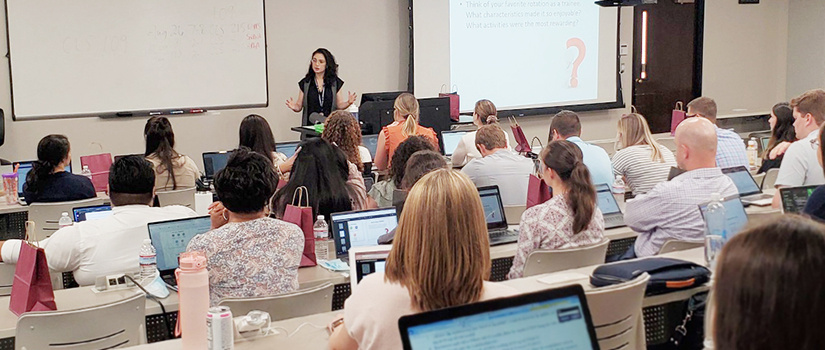About the Program
The Clinical Teaching Certificate program at the University of South Carolina College of Pharmacy is a structured educational program to enhance teaching and precepting skills, allowing pharmacists to become confident and motivational educators in both academic and clinical pharmacy settings.
Two tracks are offered within the program:
Each participant benefits from the guidance and supervision of an experienced educator who provides mentorship and facilitates engagement with the College of Pharmacy. Through development workshops, hands-on learning activities, and opportunities to create, implement, and evaluate educational experiences within academic and clinical practice environments, the CTC produces skilled life-long pharmacy educators. Upon completion of all requirements, participants are awarded a certificate demonstrating their accomplishment.
Whether you are a pharmacy resident, new practitioner, or someone potentially interested in more advanced precepting and teaching, we would love to work with you. Contact us to discuss the best path for your enrollment.
Upon completion of the CTC program, the participant will be able to:
- Develop, deliver, and assess teaching activities in a variety of instructional settings, including didactic lectures, clinical teaching/precepting, and small or large group facilitation.
- Employ effective teaching techniques based on the principles of learning.
- Assess learner performance in an effective, objective, equitable, and constructive manner.
- Incorporate self-assessment, peer assessment, mentor evaluation, and learner feedback to improve personal teaching performance.
- Demonstrate the knowledge, skills, and attitudes needed to provide effective learner-centered education as a preceptor, mentor, colleague, or faculty member.
Examples of Seminar Series Topics
- Introduction to Academia & Overview of USC COP Curriculum
- CTC Program Overview & Updates
- Blackboard Orientation for CTC Residents
- Teaching 101: Crafting Effective Lectures and Integrating Active Learning
- Teaching 102: Designing a Teaching Philosophy
- Assessment 101: Rubric-Based Evaluation and Feedback for Student Presentations
- Assessment 102: Evaluating Students on IPPE & APPE Rotations
- Assessment 103: Principles of Item Writing
- Precepting 101: A Primer for Precepting
- Precepting 102: Advanced Precepting Skills: Case Studies in Precepting
- Financial Guidance and Real Estate Financials for the Medical Professional
- Applying and Interviewing for Academic and Non-Academic Positions
- Becoming a New Practitioner
- Course Coordination & Syllabus Development (Academician Track)
- Examining Tenure and Promotion (Academician Track)
- P. Brandon Bookstaver (Co-Director)
- Brie Dunn (Co-Director)
- Reagan K. Barfield
- Betsy Blake
- Celeste Caulder
- Jennifer Clements
